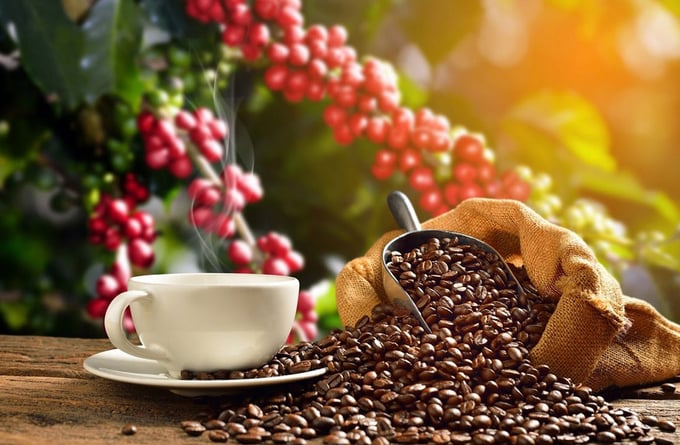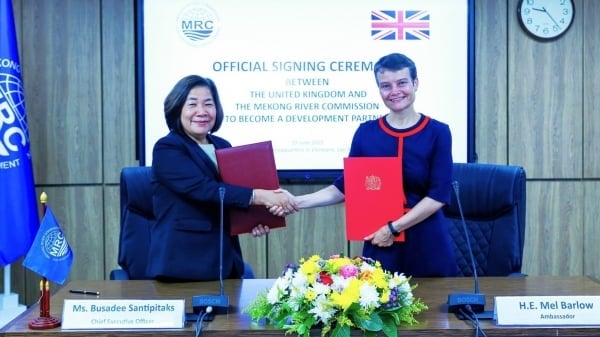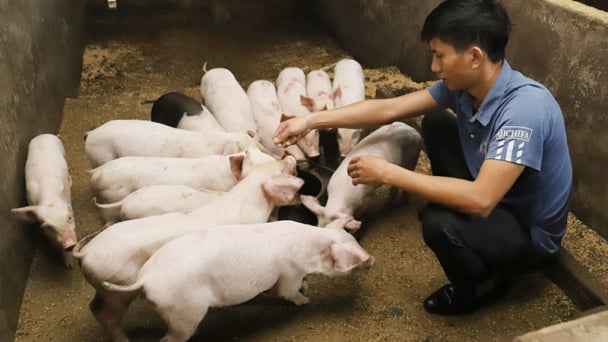June 20, 2025 | 11:55 GMT +7
June 20, 2025 | 11:55 GMT +7
Hotline: 0913.378.918
June 20, 2025 | 11:55 GMT +7
Hotline: 0913.378.918
Between the 11th and 14th of November, Deputy Minister Phung Duc Tien led a MARD team to the United Kingdom to boost agricultural trade activities in the second biggest market in Europe.
As a member of a delegation, Mr. Nguyen Quoc Toan, Director of MARD's Agro Processing and Market Development Department, spoke with Vietnam Agriculture News about the potential and demands of market opening for agricultural goods from the two nations' areas of strength.
Sir, what chances have the United Kingdom-Vietnam Free Trade Agreement (UKVFTA) afforded Vietnam, and what can we do to take full use of this agreement?
As is well known, the United Kingdom is a developed country in the world, and the post-pandemic demand for high-quality agricultural goods has increased.
In addition, the British devote a significant deal of attention to fast-consumer goods, which cater to customers' practical demands.

Deputy Minister Phung Duc Tien signed a cooperation agreement with the Permanent Secretary of the Department of Environment and Food and Rural Affairs of the United Kingdom on November 10, 2022. Photo: NT.
As a result, the purpose of our trip is to address the needs of the British market; hence, we need a group of enterprises that can meet those needs.
Particularly, we need plant-based products, organic fruit products, and retail chain-serving items to meet the needs of Vietnamese ex-pats in the United Kingdom, especially in locations with high purchasing power.
The UKVFTA is a high-level trade agreement, hence the two parties' trade exchange turnover has remained consistent throughout and after Brexit.
We cannot accept the absence of a distribution center for Vietnamese goods on the British market. Previously, we utilized Europe and Hub as a middleman for product distribution. With the existing UKVFTA, we are required to create agricultural distribution facilities for Vietnam so that agricultural goods may be shipped directly to major cities in the United Kingdom.
Our goods will establish a strong foothold on the market only when the products of firms, particularly small and medium-sized Vietnamese enterprises with trademarks, labels, intellectual property protection, and recognized quality, are permitted to access the market.
So, what is the solution? We must enter the British market immediately, without a "transit."
The United Kingdom recognizes Vietnam as its most significant agricultural partner in ASEAN. However, Vietnam's agricultural, forestry, and fisheries exports to the United Kingdom only amounted to around USD 1 billion, or 1.3% of the United Kingdom's total food import value of USD 60 billion. What are the obstacles and how can we overcome them?
The first obstacle is that our goods have lacked sufficient information. Specifically, coffee items with a capacity of USD 56 million are not available at many London restaurants or retail wholesalers. They are unfamiliar with Vietnam and its agricultural goods.
There is no link for firms without a foundation in terms of knowledge, connection on the pathway, and trade promotion operations for their items to access the market's core.
Second, we have yet to mobilize a large force consisting of Vietnamese students and workers in the United Kingdom. We recognize that if we can stimulate the behavior of this generation, which possesses extensive networks and knowledge, we will be able to convey the value of Vietnamese brands and culture in all agricultural goods.
Thus, we will have great weapons and righteous forces within the British community, and the relationship will no longer be as restricted or twisted as it was previously.
In May 2022, Deputy Minister Phung Duc Tien participated in the Vietnam-United Kingdom Business Connection Forum. In November 2022, Deputy Minister Phung Duc Tien continued to engage in several trade promotion events in the second-largest economy in Europe. What are your expectations for the trip?

Mr. Nguyen Quoc Toan - Director of the Department of Agricultural Product Processing and Development: No bareness, no formality, but trying to connect needs to needs, people to people and information to information. Photo: Tung Dinh.
With the motto "No sparse, no formality," we rigorously adhere to the Ministry's directives while attempting to integrate demands with demands, people with people, and information with information. The business delegation is divided into many sectors.
One is food-related items, which indicates that fruit products are prominent. Include coffee items such as Minh Tien coffee, the leading Arabica brand in Vietnam, along with agricultural products from the Northwest, where it is necessary to promote our traditional values.
These are the items we seek to associate with significant British groups, such as the Coffee Association and the Fruit and Vegetable Association.
Second, we will conduct a comprehensive negotiation for items of animal origin over issues pertaining to livestock. But we must have contacts to establish a foundation for our negotiating process in the past.
Thirdly, we must encourage major British enterprises to invest in Vietnam with cutting-edge agricultural technologies, particularly in the current environment.
We need strategic, long-distance investors with clean, environmentally friendly technologies and financial management skills to invest in local areas of Vietnam, such as the Central Highlands and Mekong Delta regions, as part of the country's socioeconomic recovery program.
This is a method of stating that the two parties want direct interaction in order to meet each other's needs.
In recent global trade advertisements, executives of the Ministry of Agriculture and Rural Development frequently utilize the term Vietnam's agriculture aims to become a "trustworthy partner". Could you provide further context?
The tag "trust-worthy partner" demonstrates the nature of the relationship in a respectful manner. Currently, Vietnam has become a committed partner of several large nations and economic areas.

Coffee has great potential in the UK market.
In the agro-economic sector, Vietnam is also a reliable and responsible partner, seeking transparent and high-quality agricultural development and promoting green growth in accordance with the Party and State's general policy and Vietnam's international market obligations.
This trip's message also contains an element of accountability. This is to demonstrate accountability to customers and to protect the obligation of Vietnam's producers and farmers.
Minister Le Minh Hoan emphasized that farmers seek to become professionals and that the product quality, economic worth, cultural value, and environmental value of Vietnamese agricultural goods would cover the obligation of this professionalism.
Vietnam has engaged vigorously in 17 Free Trade Agreements and is now the 15th largest exporter of agricultural products in the world and the second largest in ASEAN, with an export turnover of over USD 50 billion this year.
We are proud of these figures, but we also consider sustainable development constantly. Then, a reliable partner includes us, our friends, and our farms.
I believe that when we distribute the direction, we will have surpassed the area of a fragmented and tiny agricultural, as stated by the Minister.
In other words, a dependable partner will be a crucial component of a dependable relationship, and only with such a connection can we realize the collective wins of sustainable agricultural growth. Commitment to the world entails demonstrating the country's responsibilities, particularly in agriculture, by halting not just the obligations of governmental management but also the conduct of the entire society.
The farmer is the first person to assume responsibility, as he is the one who sows the seeds for an agricultural product, and he also bears the initial obligation.
Producers reduce pesticide residues, chemical influences on agricultural goods, and external variables, focusing instead on positive, organic, and even organic factors, and even partially substituting plant protection medications with natural enemies.
This promotes product growth, assures harmony, and safeguards the health of the producer, the farmer, and the consumer in that order.
These are the ever-changing green development trends of society, such as green consumption and green growth, and we are not immune to them.
When each farmer adjusts and takes ownership of his or her farming conduct with such a life philosophy and sense of farming responsibility, they make a significant contribution to the whole value chain.
I believe that even a tiny shift in awareness will yield significant rewards, with each farmer performing a small action and the entire supply chain creating huge value.
The finest thing about these activities and resolve is that the transition has occurred and has gotten societal support in accordance with the Strategy for Sustainable Agriculture and Rural Development in the period 2021-2030, vision to 2050 announced by the Prime Minister in early 2021.
Thank you, Sir!
Translated by Linh Linh

(VAN) On June 19, the United Kingdom officially became a Development Partner of the Mekong River Commission.

(VAN) Biodiversity is being threatened by traditional remedies made from wildlife. Traditional medicine and humans must change to live in harmony with nature.

(VAN) Agrifood investment and finance solutions for people and the planet.

(VAN) Microplastic contamination has become pervasive in seafood, posing unprecedented challenges for food safety and marine ecosystems.

(VAN) Proactively using vaccines, combined with transport control and enhanced surveillance, is the only viable path toward biosecure and sustainable livestock production in Vietnam.

(VAN) Located in the southeast of Ho Chi Minh City, the Can Gio Mangrove Biosphere Reserve is considered the ‘green lung,’ a solid shield protecting the city.

(VAN) To address plastic pollution, closing the plastic recycling cycle will bring significant economic and environmental benefits.